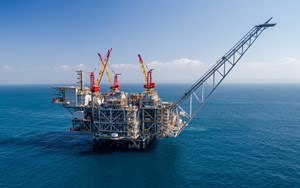Chevron to pursue Israel natural gas expansion despite Middle Eastern conflict
(Bloomberg) – Chevron Corp. will continue to pursue expansion plans for natural gas developments in Israel despite the conflict that’s erupted there, as part of its long-term view for the fuel’s future.
The company hasn’t changed its mind on expansion, in particular, at its giant Leviathan field, which has helped Israel gain energy independence and turn into an exporter of the vital fuel, Colin Parfitt, Chevron’s Vice President for Midstream, said in an interview in London.
While production at Leviathan has continued, the outbreak of the conflict has led to the shutdown of Tamar, another major field operated by Chevron. As the events are recent, there hasn’t been any change to long-term plans for the gas-rich region, Parfitt said on the sidelines of the FT Energy Transition Summit on Wednesday.
“Ours is a long-term business. You have to be able to see through some of this,” he said. “There is gas there, there is gas in the Eastern Mediterranean, you look at the world demand for gas, you look at European demand for gas - it still feels an attractive place for gas to supply.”
His comments are in line with Chevron Chief Executive Officer Michael Wirth, who said in an earnings call last week the company is taking a long-term view “measured in years and decades” as it develops projects.
Chevron’s East Mediterranean projects are part of a portfolio that also includes liquefied natural gas (LNG) plants in Australia and Africa — with sales split roughly 80% to 20% between long-term and short-term contracts. It’s evaluating the best way to bring natural gas from that region to global markets, with options including existing Egyptian LNG plants or a new floating liquefaction facility.
“We like the asset, and particularly Leviathan, which is one that has expansion. We see possibilities to expand it, and we are still figuring out what the best way to do it is,” Parfitt said.
Chevron believes in a long-term future for gas, particularly in Asia, where nations such as India and China still need to displace coal in power generation and where population growth leads to an increase in demand. Europe also still needs new supplies to replace lost Russian volumes, he said.
“Where do I see long-term demand? I think it’s Asia,” he said. “Where do I see medium-term demand? I think that’s more Europe.”



